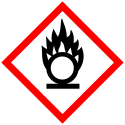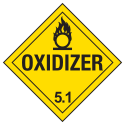
Back مؤكسد Arabic Oxidante AST Акісляльнік Byelorussian Затляняльнік BE-X-OLD Окислител Bulgarian জারক Bengali/Bangla Oksidans BS Oxidant Catalan ھۆکاری ئۆکسێن CKB Oxidační činidlo Czech


An oxidizing agent (also known as an oxidant, oxidizer, electron recipient, or electron acceptor) is a substance in a redox chemical reaction that gains or "accepts"/"receives" an electron from a reducing agent (called the reductant, reducer, or electron donor). In other words, an oxidizer is any substance that oxidizes another substance. The oxidation state, which describes the degree of loss of electrons, of the oxidizer decreases while that of the reductant increases; this is expressed by saying that oxidizers "undergo reduction" and "are reduced" while reducers "undergo oxidation" and "are oxidized". Common oxidizing agents are oxygen, hydrogen peroxide, and the halogens.
In one sense, an oxidizing agent is a chemical species that undergoes a chemical reaction in which it gains one or more electrons. In that sense, it is one component in an oxidation–reduction (redox) reaction. In the second sense, an oxidizing agent is a chemical species that transfers electronegative atoms, usually oxygen, to a substrate. Combustion, many explosives, and organic redox reactions involve atom-transfer reactions.
© MMXXIII Rich X Search. We shall prevail. All rights reserved. Rich X Search